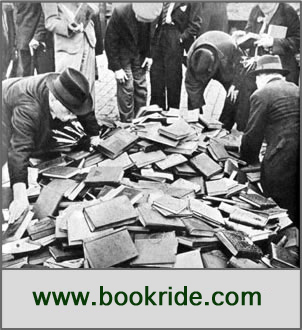
As a jobbing bookseller I am sometimes asked what it takes to succeed in this trade. Success in book selling is elusive, these days merely to survive is to succeed. However I have jotted down some qualities that may be needed by a used book seller/ dealer. To have all of them would lead to canonisation but it is crucial to have a few.
Memory-- ideally a Funes-like memory (Borges) for every book ever seen, useful for determining rarity and especially for discarding the common and worthless. The Web has made this quality less essential but without it the seller can waste much time checking out useless and quotidian dogs. It is also helpful to have seen a lot of books, sellers should start young...
Mathematical skills-- the ability to do quick sums in the head is almost essential. Without it you need other qualities in abundance (or a trust fund.)
Intuition / Perceptiveness /Clairvoyance - the ability to sum people up, especially sellers of collections. Useful for sorting out time-wasters, those on fishing expeditions and persons with unreasonable levels of expectation. Qualities sometimes possessed in large doses by booksellers with no great knowledge of books themselves, and leading to great financial success. Such booksellers are sometimes also able to 'divine' that certain books are of great value.The fictional antique dealer Lovejoy (a 'divvy') had this quality and it is by no means imaginary.
Knowledege. A vast. but necessarily shallow, knowledge of almost everything + the ability to spell and use correct grammar less they be persecuted by Lynne Truss and her cohorts (now a sizeable army).
Tech Skills. Techno knowledge, or at least a cheap and willing friend who is an unashamed geek. Typing skills are also pretty useful but few can spare Mavis Beacon the 30 hours it takes to acquire real speed.
Patience, stoicism, the ability to endure extended periods of great hardship and tedium (and also sudden good fortune).
Physical hardiness, strength in the arms, indefatigability, a good walking speed...
A Buddha-like implacability-- a bookseller will have many reversals of fortune, gluts and busts, ones that got away, disdained colleagues who suddenly hit the jackpot etc., Also he or she must never get carried away at auctions or start buying books indiscriminately after a coup.
Sobriety-- some resistance to the temptations of good living, the tendency of bookinistas to celebrate every victory and medicate every reversal...
Chastity-- the ability to
 resist the blandishments of customers of either sex attracted to the quaintness and sheer coolness of bookselling.
resist the blandishments of customers of either sex attracted to the quaintness and sheer coolness of bookselling.Loyalty--the ability to be nice to customers who were once great spenders but are now either broke or have got everything they need (you might even get their books one day).
Generosity - the most valuable quality a bookseller can have. Generous with his or her knowledge (often to the point of boredom) and time, a generous buyer and a generous pricer. More money can be made by buying well and pricing low as opposed to the common practice of paying very little and charging a lot. The latter bookseller can sometimes prosper (but is never liked, his name usually spoken with a vile curse) but more often he becomes so broke that he has to get a real job. It is no coincidence that the most generous man on the planet is also the wealthiest. Step forward Bill Gates, philanthropist (and book collector.)
Humility-a rare quality -no longer necessary, except in the unlikely case of incredible financial success.










